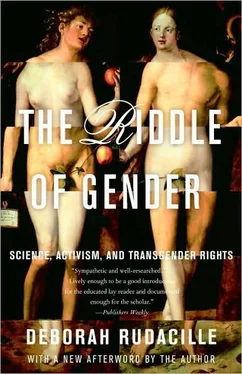Deborah Rudacille
THE RIDDLE OF GENDER
Science, Activism, and Transgender Rights
Glory be to God for dappled things—
........................................
All things counter, original, spare, strange;
Whatever is fickle, freckled (who knows how?)
With swift, slow; sweet, sour; adazzle, dim;
He fathers-forth whose beauty is past change
—Gerard Manley Hopkins, “Pied Beauty”
“And what sort of person might you be?” asked the smiling young man behind the registration desk.
I stared at him for a moment in bafflement and dread, running through a list of potential responses. I was registering for the True Spirit Conference, an annual gathering for transsexual men and their partners and families. It was my first foray into the community, and I was nervous and feeling very much like an outsider; I was sure that people could tell merely by looking at me that I didn’t belong.
“Well…” I said, preparing to announce that I was a heterosexual woman, a single mother of three, and a science writer, when suddenly I noticed the three options for registration on the page I had just signed: student, low income, and regular.
“Regular,” I said, with relief.
“Great,” the young man replied, as I filled out a check for ninety dollars and handed it over, my face burning as I realized how close I had come to looking like an idiot.
Nonetheless, throughout the next two days, as I attended sessions and introduced myself to people at the conference, I was asked the same question over and over in varying forms. The answer to the question seemed important to everyone I met. What kind of person are you? Why are you here? Why are you interested in our lives? Not far beneath those questions lurked accusations. Are you here to exploit us? To attack us? To make us look like freaks or deviants? “Just what,” one guy said, “is your agenda?” I thought the question fair enough. And since it has been posed, in one form or another, by everyone whom I have interviewed on this subject, I feel that it is right that I begin this book with an answer to it, since it is probably also a question that will be entertained by readers.
I attended the True Spirit Conference in 2001 because I had recently learned that a friend of mine was transitioning from female to male. This baffled me, as I knew nothing at all about transsexuality, transgenderism, gender-queerness, or gender variance, nothing at all about the motivations that would impel a twenty-two-year-old female-bodied person to inject herself with testosterone or undergo a mastectomy or live as a man. I was concerned and confused and I soon learned that I was not alone. Nearly everyone I spoke with about the subject was as confused as I was, and in some cases far more judgmental. “That’s crazy,” “It’s sick,” and “That’s disgusting” were some of the most extreme comments, together with the pious “It’s against God’s plan to change your sex” and the pseudoscientific “She needs psychiatric help.”
It’s important to note that these comments were uttered by people who are more or less comfortable with homosexuality. People who had accepted and embraced gay friends, colleagues, and family members seemed bewildered by transsexuality and its close cousin transvestism, or cross-dressing. The adjective “transgendered”—indicating individuals who either cross the great gender divide or live between the poles of male and female—is recognized, but not, it seems, widely understood. I found this to be no less true of my children’s generation than of my own or my parents’. This lack of understanding breeds fear, and fear often gives birth to violence. This was brought home to me most acutely a few months after I learned of my friend’s decision to transition, when a transwoman (male-to-female, or MTF, transsexual) was murdered a few blocks from my home.
Walking home from a neighborhood bar, Tacy Ranta was shot by a gang of adolescents and young adults who had been on a crime spree, carjacking and mugging twelve people in the neighborhood over a five-hour period. Although the miscreants robbed everyone, the only person they shot was Ranta. The newspaper reports on the murder focused on Ranta’s transsexuality and used the male pronouns of her birth sex when referring to her, even though she had been living as a woman for years and, in the month preceding her murder, had had the sex on her driver’s license altered from M to F.
The murder of Tacy Ranta mere blocks from my home, coming on the heels of my friend’s announcement, caused me to confront my basic lack of knowledge and understanding of a group of people who I barely knew existed. I wanted to know more about gender variance, and though this desire was born partly of a desire to understand and support my friend, it was also linked to my own lifelong questioning of gender roles.
I was born in 1958 and grew up in the seventies, when large numbers of women began to challenge the institutions and assumptions that had created their social subordination. I lived through the second wave of feminism and I know that my life has been profoundly affected by the vastly increased opportunities for women and the breakdown of gender stereotypes that were its fruits.
Yet I, like many women, have also felt ambivalent about some of the results of that revolution. I remember very well the patronizing attitudes I encountered from other women when I chose to remain at home with my preschool children during the eighties. The unspoken assumption seemed to be that only a chump would sacrifice her career advancement to take care of babies. Virtues traditionally gendered female (modesty, gentleness, and emotional generosity) were scorned by those who viewed them as a pathetic accommodation to the patriarchal status quo. The qualities our culture respects and rewards are the traditionally masculine traits of independence, assertiveness, and enlightened self-interest, and feminism has done nothing to change that. We wanted the best of both worlds; instead it seems sometimes that we have the worst of each. Women have been liberated to become rakes and workaholics, and men have won the freedom to drift aimlessly in a kind of perpetual adolescence. This may be a kind of progress, but it is not the equality between the sexes once envisioned by feminists.
And despite our well-intentioned efforts to melt gender stereotypes with the blowtorch of change, differences remain. As a parent, I have certainly observed what seem to be gender-mediated differences between my daughters and my son throughout their childhood, adolescence, and young adulthood. As toddlers, they played equally happily with the Little Tikes play kitchen, a car, and various other gender-neutral toys that I as a feminist parent provided. But at a certain point, my son and his best friend began to develop an interest in dinosaurs and Godzilla, to manufacture guns and swords out of tree branches, and to engage in the kind of semi-serious wrestling and roughhousing that often produced minor injuries. Yet my son’s two trips to the emergency room in early childhood were the result of “accidental” injuries inflicted by his older sister. Clearly, she hadn’t heard the news that girls are less aggressive than boys!
On the other hand, from a young age my daughters were far more attuned to social nuances than was my son. While her brother could sit in the same classroom for years with various children and still not know their names, my younger daughter could rattle off not only the names but also the familial and social bonds uniting every child in the elementary school. She and her older sister have always possessed a kind of emotional radar that their more analytical brother lacks. Yet my son, unlike his sisters, remains close to his best friends from elementary and middle school, a challenge to the prevailing wisdom that females have a greater gift for forming long-lasting intimate friendships.
Читать дальше












